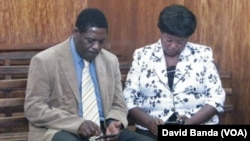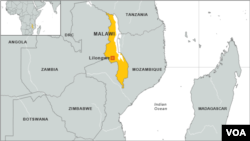Treza Namathanga Senzani, the first person convicted in a 2013 government scandal involving corruption, lootting and the theft of more than $30 million in public funds, received a three-year jail sentence by the Malawi High Court on Tuesday.
Senzani, the former principal secretary in the Ministry of Tourism, had pleaded guilty to stealing about $150,000 in the financial scam, referred to in Malawi as the Cashgate scandal, which prompted donor partners to withdraw their budgetary support to the country.
Before the verdict was passed, Senzani's defense lawyer, Necton Mhura, pleaded with the court to be lenient with Senzani, whose charges of theft and money laundering have a maximum possible sentence of 10 years in prison.
Mhura cited mitigating factors, such as Senzani’s plea of guilty, her status as a first offender and her return of the stolen money.
Case carries serious repercussions
Lilongwe High Court Justice Ivy Kamanga rejected the argument, saying the case had serious repercussions for Malawi.
Kamanga then sentenced Senzani to nine months in prison for theft and three years with hard labor for money laundering, with those sentences to run concurrently.
State Prosecutor Reyneck Matemba welcomed the ruling.
“We are happy with the ruling. As you recall in our submissions, what we were fighting for was a custodial sentence, not a suspended sentence," Matemba said. "Yes, she pleaded guilty and the restitution was made, but when you look at the gravity of offenses we charged her, theft and money laundering, they are serious offences.”
Defense lawyer Mhura called the sentence given to his client a miscarriage of justice.
“We are obviously disappointed by the ruling. We thought she will get a non-custodial sentence because aside from the fact that she is a first offender, she has pleaded guilty, she has paid back the money [and also] she has cooperated with prosecution authorities. [So] we are considering an appeal," Mhura said.
Others said the three-year sentence given to Senzani is too lenient, and will not deter anyone from committing a similar offense.
“A punishment is a deterrent, otherwise if we have lenient sentences, chances are that we may not be dealing with the problem because people will calculate and conclude that perhaps it is worthwhile taking a risk of being in prison for three years and thereafter enjoy millions of dollars that were stolen from government coffers," said Ernest Thindwa, a political science lecturer at the Chancellor College of the University of Malawi.
Human rights campaigner Billy Banda faults the system of using the courts to handle these corruption cases.
“Administration of justice should have been done through Truth and Reconciliation, and all those that would be convicted and all those that would voluntarily agree that they had taken a hand in the loot and allowed to pay back the money that would be recovered would be committed to other essential areas to service the plight of citizenry in the country," Banda said.
Malawians split on sentence
Ordinary Malawians are divided about the sentencing.
“Mrs. Senzani gave back the money she stole and there is nothing that the court could have done. By giving her three years is just fine," said Chisomo Lapken, a university student in Blantyre.
Shakira Juma, a Blantyre businesswoman, said, “What I can say to the sentence of three years imprisonment is that I think it’s not fair, she has been given a softer punishment than what I was expecting as a concerned Malawian."
Blantyre bus driver Andrew Chilapondwa said, “I think the verdict is fair, considering the fact that government as well as the courts took every penny from Mrs. Senzani’s bank account."
More than 60 suspects, including civil servants, business people and former government officials, are on trial for various offenses following their arrest last year in what is believed to be the biggest financial scandal in the country’s history.





